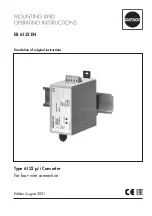
II Safety Precautions and Instructions
TP-6334
9/04
Battery short circuits.
Explosion
can cause severe injury or death.
Short circuits can cause bodily injury
and/or
equipment
damage.
Disconnect
the
battery
before
generator
set
installation
or
maintenance.
Remove all jewelry
before servicing the equipment. Use
tools with insulated handles. Remove
the negative (--) lead first when
disconnecting the battery. Reconnect
the negative (--) lead last when
reconnecting
the
battery.
Never
connect the negative (--) battery cable
to the positive (+) connection terminal
of the starter solenoid. Do not test the
battery
condition
by
shorting the
terminals together.
Engine Backfire/Flash
Fire
Fire.
Can cause severe injury or death.
Do not smoke or permit flames or
sparks near fuels or the fuel system.
WARNING
Servicing the fuel system. A flash
fire can cause severe injury or death.
Do not smoke or permit flames or
sparks near the carburetor, fuel line,
fuel filter, fuel pump, or other potential
sources of spilled fuels or fuel vapors.
Catch fuels in an approved container
when
removing
the
fuel
line
or
carburetor.
Servicing the air cleaner. A sudden
backfire can cause severe injury or
death.
Do not operate the generator
set with the air cleaner removed.
Combustible materials. A fire can
cause
severe
injury
or
death.
Generator set engine fuels and fuel
vapors are flammable and explosive.
Handle these materials carefully to
minimize the risk of fire or explosion.
Equip the compartment or nearby area
with a fully charged fire extinguisher.
Select a fire extinguisher rated ABC or
BC
for
electrical
fires
or
as
recommended by the local fire code or
an authorized agency.
Train all
personnel
on
fire
extinguisher
operation
and
fire
prevention
procedures.
Exhaust System
Carbon monoxide.
Can
cause
severe
nausea,
fainting, or death.
The
exhaust
system
must
be
leakproof and routinely inspected.
WARNING
Generator set operation.
Carbon
monoxide can cause severe nausea,
fainting, or death.
Carbon monoxide
is an odorless, colorless, tasteless,
nonirritating gas that can cause death if
inhaled for even a short time. Avoid
breathing exhaust fumes when working
on or near the generator set. Never
operate the generator set inside a
building unless the exhaust gas is
piped safely outside. Never operate
the generator set where exhaust gas
could accumulate and seep back inside
a potentially occupied building or
vehicle. Do not obstruct the exhaust
outlet when parking your vehicle. The
exhaust gases must discharge freely to
prevent
carbon
monoxide
from
deflecting into the vehicle.
Carbon
monoxide
symptoms.
Carbon monoxide can cause severe
nausea, fainting, or death.
Carbon
monoxide is a poisonous gas present in
exhaust gases.
Carbon monoxide
poisoning symptoms include but are
not limited to the following:
D
Light-headedness, dizziness
D
Physical fatigue, weakness in
joints and muscles
D
Sleepiness, mental fatigue,
inability to concentrate
or speak clearly, blurred vision
D
Stomachache, vomiting, nausea
If experiencing any of these symptoms
and carbon monoxide poisoning is
possible, seek fresh air immediately
and remain active. Do not sit, lie down,
or fall asleep.
Alert others to the
possibility
of
carbon
monoxide
poisoning. Seek medical attention if
the condition of affected persons does
not improve within minutes of breathing
fresh air.
Installing the exhaust tail pipe.
Carbon monoxide can cause severe
nausea, fainting, or death.
Install the
exhaust system tail pipe to prevent the
drawing of discharged exhaust gases
into
the
vehicle
interior
through
windows, doors, air conditioners, and
other openings. Do not use flexible tail
piping because it could crack and allow
lethal exhaust fumes to enter the
vehicle.
Inspecting
the
exhaust
system.
Carbon monoxide can cause severe
nausea, fainting, or death.
For the
safety of the vehicle’s occupants, install
a carbon monoxide detector. Consult
the
coach
builder
or
dealer
for
approved
detector
location
and
installation. Inspect the detector before
each generator set use. In addition to
routine exhaust system inspection, test
the carbon monoxide detector per the
manufacturer’s instructions and keep
the detector operational at all times.
Summary of Contents for 10ERG
Page 1: ...Commercial Mobile Generator Sets Model 10ERG 13ERG 15ERG TP 6334 9 04 Operation...
Page 4: ......
Page 10: ...VI Safety Precautions and Instructions TP 6334 9 04 Notes...
Page 14: ...TP 6334 9 04 2 Service Views Notes...
Page 20: ...8 Operation TP 6334 9 04 Notes...
Page 38: ...TP 6334 9 04 26 Section 5 Wiring Diagrams GM28747A C Figure 5 1 Wiring Diagram Sheet 1 of 2...
Page 39: ...TP 6334 9 04 27 Section 5 Wiring Diagrams GM28747B C Figure 5 2 Wiring Diagram Sheet 2 of 2...
Page 40: ...TP 6334 9 04 28 Section 5 Wiring Diagrams ADV6846A A Figure 5 3 Schematic Diagram Sheet 1 of 2...
Page 41: ...TP 6334 9 04 29 Section 5 Wiring Diagrams ADV6846B A Figure 5 4 Schematic Diagram Sheet 2 of 2...
Page 42: ...TP 6334 9 04 30 Section 5 Wiring Diagrams GM33846 A Figure 5 5 Accessory Wiring Diagram...
Page 46: ......
Page 47: ......







































